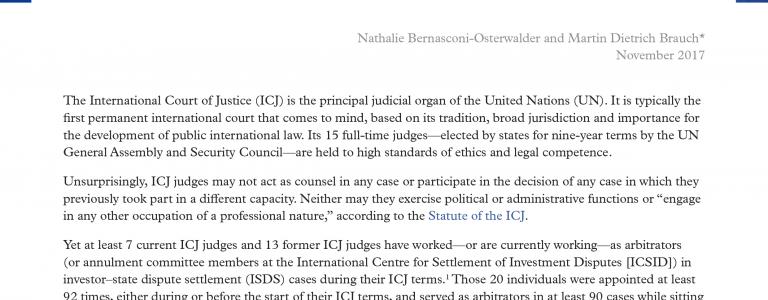Is “Moonlighting” a Problem? The role of ICJ judges in ISDS
Sitting judges of the International Court of Justice have worked as arbitrators in at least 90 investor–state dispute settlement cases. This commentary presents new data and examines the implications.
The International Court of Justice (ICJ) is the principal judicial organ of the United Nations (UN). It is typically the first permanent international court that comes to mind, based on its tradition, broad jurisdiction and importance for the development of public international law.
Its 15 full-time judges—elected by states for nine-year terms by the UN General Assembly and Security Council—are held to high standards of ethics and legal competence.
Unsurprisingly, ICJ judges may not act as counsel in any case or participate in the decision of any case in which they previously took part in a different capacity. Neither may they exercise political or administrative functions or “engage in any other occupation of a professional nature,” according to the statute of the ICJ.
Yet at least seven current ICJ judges and 13 former ICJ judges have worked—or are currently working—as arbitrators (or annulment committee members at the International Centre for Settlement of Investment Disputes [ICSID]) in investor–state dispute settlement (ISDS) cases during their ICJ terms. Those 20 individuals were appointed at least 92 times, either during or before the start of their ICJ terms, and served as arbitrators in at least 90 cases while sitting as ICJ judges.
If we consider only the 78 treaty-based cases among those 90 and the full universe of 817 treaty-based ISDS cases known as of July 31, 2017, this means that ICJ judges have sat as arbitrators in roughly 10 per cent of all known investment treaty cases during their tenure.
This commentary presents statistics and raises a number of issues for governments and other stakeholders to think about regarding the involvement of sitting ICJ judges as arbitrators in investor–state disputes. This practice appears to entangle the ICJ in situations that undermine its reputation for independence as the highest authority on public international law. As international investment arbitration continues to expand, the entanglements will become more pervasive and complex.
For more information please read our accompanying press release.
You might also be interested in
Stabilization Clauses: The hidden provisions that can hinder tax and investment policy reform
Stabilization clauses should no longer automatically be included in contracts between states and investors. If they are, they should, at a minimum, build on the latest international standards on stabilization to avoid being a barrier to sustainable development.
What Drives Investment Policy-makers in Developing Countries to Use Tax Incentives?
The article explores the reasons behind the use of tax incentives in developing countries to attract investment, examining the pressures, challenges, and alternative strategies that exist.
Brussels push to ban ECT disputes gains traction
Two arbitration victories for Spain under the Energy Charter Treaty (ECT) have sparked hopes that efforts to halt the intra-EU disputes that dominate claims under the controversial global pact are starting to bear fruit. Climate scholars, like IISD's Lukas Schaugg, believe the tribunal wins this month signal growing acceptance in international legal circles that EU investors cannot bring ECT claims against other member state governments.
Sustainability rules to impact global trade
Developed countries should consult developing countries in crafting global sustainability rules to prepare these markets for the impact of stringent regulations that may hamper global trade, a United Nations official said at IISD's recent Investment Policy Forum.
